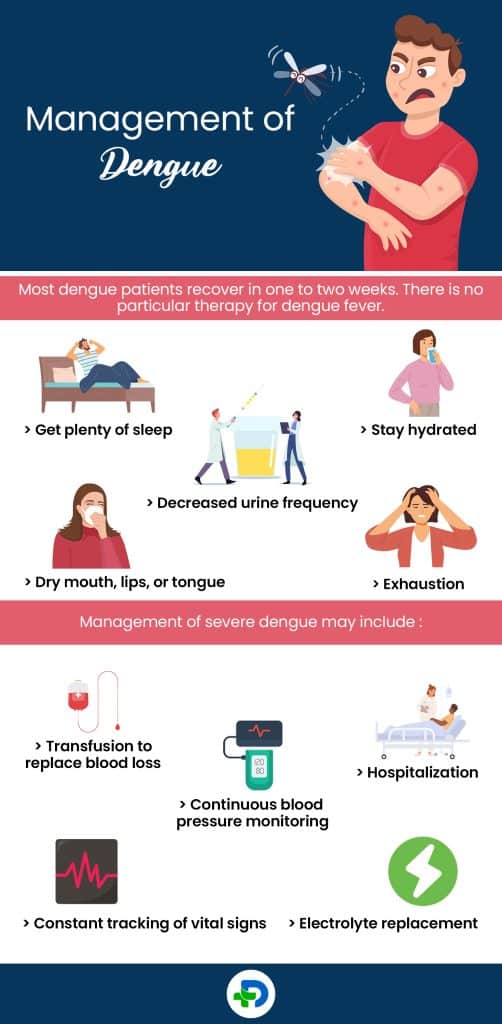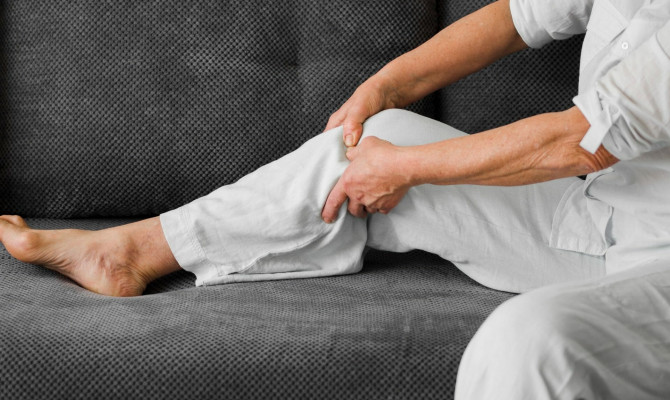Dengue : Complications and Management

- Dengue
- 14 Aug 2023
Overview
What is Dengue?
Dengue is a viral infection caused by DENV virus. It is transmitted to humans through the bite of an infected mosquito. Due to the severity of the muscular and joint pain, it is also referred to as break bone fever or dandy fever and due to the unusual duration, it is called a seven-day fever.1Overview| Researched based study from Nlm.nih.govThe majority of dengue cases occur in tropical and subtropical areas around the globe, mainly affecting urban and semi-urban areas. 2Overview | Researched based study from Who.int During the rainy season, outbreaks are more frequent. While a lot of people with dengue are asymptomatic or have only mild illness, dengue can rarely cause severe complications and even death.

Symptoms
Symptoms of Dengue
The majority of dengue patients exhibit minimal or no signs. When they do, symptoms typically appear four to ten days following exposure and continue for three to seven days 3Symptoms | Researched based study from Nlm.nih.gov and may include the following:
- High fever – The most typical sign.
- A terrible headache.
- Nausea.
- Vomiting.
- Diarrhea.
- Skin rashes.
- Body ache.
- Eye pain.
- Joint pain.
- Bone pain.
- Swollen glands.
- Metallic taste.
Dengue fever can be serious in rare cases. The following are examples of warning symptoms that may appear in the first two days after the fever has subsided:
- Intense abdominal pain.
- Repeated vomiting.
- Short, rapid breathing.
- Nose or gum bleeding.
- Skin bruising.
- Restlessness.
- Irritability.
- Tiredness.
- Feeling weak.
- Dry mouth and lips.
- Cold and pale skin.
- Dark or tarry stool.
- Excess menstrual bleeding.
- Blood in vomit or urine.
Causes
Cause and transmission:
There are four dengue viruses responsible for dengue fever, namely:
- DENV 1
- DENV 2
- DENV 3
- DENV 4
The virus can spread to people in three different ways:
From a mosquito
- The Aedes species mosquitoes (Aedes aegypti or Aedes albopictus) that carry the dengue virus bite humans and transmit the disease. 4Causes and transmission | Researched based study from Cdc.gov It mostly happens throughout the rainy season.
- When a mosquito bites an individual with dengue virus, it picks up the virus.
- After that, the virus enters the bloodstream of the next person bitten by the infected mosquito and produces dengue infection.
From mother to child
- A pregnant woman who is infected with a dengue virus (DENV) can transmit the virus to her child during pregnancy or at the time of delivery.
- It cannot be transmitted through breast feeding.
Through contaminated blood
- Blood transfusion.
- Organ transplant.
- Needle stick injury.
Risk
Risk factors
The following things could put people at risk for dengue:
- Unplanned urbanization – Residents in highly populated areas that have less access to dependable water supplies, water storage techniques, etc.
- People in high-risk areas – Travelers and residents of tropical and subtropical regions like Southeast Asia, Western Pacific Islands, Latin America, and Africa, are more likely to be exposed to the dengue virus.
Who is at higher risk?
Individuals who are at higher risk may include:
- Infants.
- Pregnant women.
- Older individuals at or above 65 years.
- Poor socio-economic situation.
- People with compromised immunity.
- One with diabetes mellitus.
- One with kidney failure.
- People with a history of dengue.
These high-risk individuals must take extra precautions to avoid exposure to the dengue virus.
Prevention
Preventing Dengue
The following steps can help a person prevent getting infected by the dengue virus:
- People should wear long sleeves, long trousers, socks, and shoes to cover themselves, especially if they are in an area where these mosquitoes are prevalent.
- Reduce mosquito breeding grounds – They lay eggs in standing water like the rainwater accumulated in containers like tubs or barrels, old tires, etc. To halt them from breeding and reduce their population, it is best to remove these habitats.
- To keep mosquitoes out of the house, fix any tears in the window nets, and if it is possible, keep the doors and windows closed.
- Pregnant women should try and avoid traveling to dengue-infested regions as much as possible.
- Clothing, shoes, camping equipment, and bed covering can all be treated with permethrin, a repellent for mosquitoes.
- Apply a skin-safe mosquito repellent with a DEET concentration of at least 10%.
- To keep mosquitoes away, use mosquito coils and vaporizers.
- People who are eligible to get dengue vaccination (Dengvaxia) may get the vaccine shot. However, it is not yet accessible to everyone. 5Prevention | Researched based study from Cdc.gov In addition, those who contract dengue after receiving a vaccination are said to be at an increased risk of developing severe dengue.
Complications
Complications of Dengue
Most individuals return to normal in a week or so. Rarely, a condition known as severe dengue, dengue hemorrhagic fever, or dengue shock syndrome develops where symptoms intensify and become potentially fatal.
Complications of severe dengue may include
- Seizures.
- Pneumonia.
- Liver failure.
- Heart disease.
- Internal bleeding.
- Blurred vision.
- Kidney damage.
- Inflamed testicles.
- Inflamed ovaries.
- Brain damage. 6Complications | Researched based study from Nlm.nih.gov
- Shock.
- Death.
Complications in pregnancy 7Complications | Researched based study from Mpdi.com
- Early labor.
- Miscarriage.
- Stillbirths.
- Low birth weight in newborns.
- Transmission of dengue to the baby.
- Fetal distress in babies.
Diagnosis
How to diagnose Dengue ?
Dengue fever can be challenging to diagnose because its signs and symptoms are similar to those of other illnesses like chikungunya, malaria, etc.
Blood tests are typically used by doctors to identify dengue illness.
Complete blood count
- The number of white blood cells may drop, along with the drop in the number of platelets and there may be a presence of metabolic acidosis.
- There may be a decrease in hemoglobin, hematocrit, and red blood cell count that may indicate blood loss.
- May be done to rule out the possibility of other infections.
Laboratory tests
To confirms Dengue infection 8Diagnosis| Researched based study from Nlm.nih.gov
- Serological test – to detect antibodies against the dengue virus and to find whether the dengue infection is ongoing or recent.
- Virological test – to look specifically for virus components – gives the most accurate test result. (Not all medical institutions may offer this test because it frequently requires specialized tools.)
Management

Management of Dengue
Most dengue patients recover in one to two weeks. There is no particular therapy for dengue fever.
Dengue is generally managed by doing the following:
- Get plenty of sleep.
- Stay hydrated – drink lots of fluids like water, fruit juice, etc.
- For discomfort and fever, take acetaminophen.
- Stay away from non-steroidal anti-inflammatory drugs (NSAIDs), which include ibuprofen, aspirin, and others as they can raise the chance of dengue fever bleeding complications.
- Pay attention to any serious symptoms and contact a physician right away if there are any.
Look for indications of dehydration and take the patient to the nearest hospital or emergency room if any of the following symptoms appear: 9Management | Researched based study from Cdc.gov
- Decreased urine frequency.
- Few or no tears when crying.
- Dry mouth, lips, or tongue.
- Cold toes and fingers.
- Disorientation.
- Confusion.
- Exhaustion.
Management of severe dengue may include:
- Hospitalization.
- Supportive care with Intravenous fluid. (IV)
- Electrolyte replacement.
- Constant tracking of vital signs.
- Continuous blood pressure monitoring.
- Management of blood sugar levels.
- Platelet transfusion if the count is less than 10,000/mm3. 10Management| Researched based study from Nlm.nih.gov
- Transfusion to replace blood loss.
Prognosis
Prognosis of Dengue
Control of carriers is essential for the prevention and treatment of dengue. People who have recovered from dengue fever may have developed lifelong antibodies to that particular virus that infected them, but they may still be susceptible to dengue infection from one of the other three dengue viruses in the future. A severe case of dengue is more likely to affect people who have already been exposed once. For the most part, dengue fever is treated successfully and without any long-term consequences. The chances of it getting worse to serious dengue are one in twenty. If a person develops serious dengue and becomes severely ill, they will still probably recover if they receive immediate medical care.
Any feedback on this article?
 This Articles content was accurate
This Articles content was accurate Very Informative Article
Very Informative Article I have a question or a comment
I have a question or a comment
 This article contains inaccurate content
This article contains inaccurate content This article was not helpful
This article was not helpful I have a question or a comment
I have a question or a comment
We appreciate your helpful feedback!
Checkout our social pages
References
-
National Library of Medicine
Dengue Fever | Overview
-
World Health Organization
Dengue and severe dengue -Factsheets | Overview
-
National Library of Medicine
Dengue virus: A global human threat: Review of literature | Symptoms
-
Centers for Disease Control and Prevention
Dengue-Transmission | Causes | Transmission
-
Centers for Disease Control and Prevention
Dengue Vaccine-Dengue Vaccine | Prevention
-
National Library of Medicine
Neurological Complications of Dengue Fever | Complications
-
MDPI
Dengue in Pregnancy: A Southeast Asian Perspective | Complications
-
National Library of Medicine
Dengue: a continuing global threat | Diagnosis
-
Centers for Disease Control and Prevention
Dengue Case Management | Management
-
National Library of Medicine
Management of Dengue: An Updated Review | Management





































